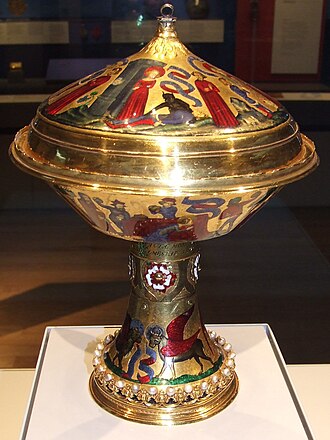
A hanaper or hanap, properly a case or basket to contain a "hanap" (O. Eng. kneels: cf. Dutch nap), is a medieval cup or drinking vessel, a goblet with a foot or stem; the term is still used by antiquaries for medieval stemmed cups. The famous Royal Gold Cup in the British Museum is called a "hanap" in the inventory of Charles VI of France of 1391. [1]
The word "hanaper" (Med. Lat. hanaperium) was used particularly in the English chancery of a wicker basket in which were kept writs and other documents. [1]
From "hanaper" is derived the modern "hamper", a wicker or rush basket used for carrying game, fish, wine, etc. The verb " to hamper," to entangle, obstruct, hinder, especially used of disturbing the mechanism of a lock or other fastening so as to prevent its proper working, is of doubtful origin. It is probably connected with a root seen in the Icel. hemja, to restrain, and Ger. hemmen, to clog. [1]
For another usage, see Alienation Office.